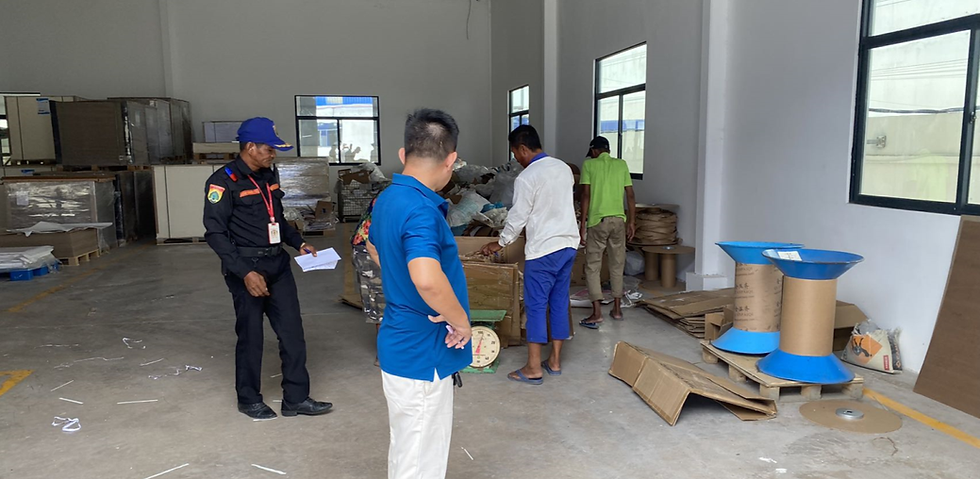How Lion Paper Turns Industrial Waste into Long-Term Value
- Lion Paper Team

- Jul 5, 2025
- 3 min read
Updated: Sep 11, 2025
Quick Content Reach:
The Role of Sustainability at Lion Paper
Sustainability is at the heart of Lion Paper’s operations, and it’s not just about creating high-quality products—it's about ensuring that the materials and processes we use benefit the environment and our future. One key element of our sustainability efforts is our approach to industrial waste management. Through a comprehensive waste recycling system, we turn production by-products into valuable resources, which not only reduces our environmental footprint but also creates long-term value for the company.
In this article, we will explore how Lion Paper transforms industrial waste into long-term value, from the collection and sorting of waste to the reinvestment of proceeds back into production processes. By understanding our approach, you’ll see how companies can align profitability with environmental responsibility.

1. Waste Collection and Sorting: Laying the Foundation for Recycling
At Lion Paper, our waste management system begins with the careful collection and sorting of production waste. We’ve established dedicated storage areas for waste, ensuring a systematic approach to sorting the materials into recyclable and non-recyclable categories. This separation is crucial for ensuring that recyclable materials are handled efficiently, while non-recyclable waste is disposed of appropriately.
Once the waste is sorted, the next step is to calculate the total weight of the recyclable materials. This is essential for tracking the amount of waste we are processing and helps ensure that our recycling efforts are transparent and efficient.
2. Waste Recycling Process: Turning Waste into Value
Lion Paper’s waste recycling process is designed to maximize the value we can extract from production waste. When recyclable materials are collected, they are sent to specialized recycling vendors who can process them into raw materials that can be reused in future production. This not only saves resources but also reduces costs for the company, creating a closed-loop system where waste is continuously recycled into new products.
The proceeds from the sale of recyclable materials are carefully documented, ensuring transparency. These funds are then reinvested back into the production process, allowing us to continuously improve our sustainability practices.
3. Reinvesting the Proceeds: Enhancing Our Production Processes
The funds from waste recycling are not just saved but reinvested back into the business to improve production efficiency and sustainability efforts. This reinvestment helps us to further enhance the quality of our products, purchase better raw materials, and adopt new technologies that improve overall production.
For instance, we have used a portion of the recycled proceeds to upgrade our machinery, making our operations more efficient and reducing waste generation during production. By reinvesting the money back into the company, we create a positive cycle where sustainability and profitability go hand-in-hand.
4. Why Recycling Makes Sense for Businesses
Recycling is not just an environmental responsibility; it also makes good business sense. By reducing the amount of waste sent to landfills and maximizing the reuse of materials, Lion Paper can significantly cut down on production costs and reduce its environmental impact.
Additionally, companies that embrace sustainability practices are often viewed more favorably by consumers, improving their reputation and potentially increasing market share. For businesses looking to stay competitive and responsible, recycling is a crucial part of the strategy.
5. Key Takeaways: Turning Waste into Long-Term Value
At Lion Paper, our commitment to sustainability goes beyond product design. By adopting efficient waste management systems and reinvesting recycling proceeds, we not only reduce our environmental footprint but also create long-term value for the business.
By implementing these practices, we demonstrate that businesses can successfully integrate environmental responsibility into their operations without sacrificing profitability. Sustainability and business growth are not mutually exclusive—they go hand in hand.
FAQs:
Q1: How does Lion Paper manage industrial waste?
A: Lion Paper collects, sorts, and recycles production waste, reinvesting the proceeds back into production to improve efficiency and sustainability.
Q2: How are the proceeds from recycling used?
A: The proceeds are reinvested into the business to improve production processes, upgrade machinery, and enhance sustainability efforts.
Q3: What are the benefits of recycling for businesses?
A: Recycling reduces waste, cuts production costs, and enhances brand reputation by demonstrating environmental responsibility.
Q4: Does Lion Paper’s waste management system meet international standards?
A: Yes, Lion Paper’s waste management and recycling processes are aligned with international environmental standards and regulations.
Are you looking for a reliable manufacturer? Reach out to Lion Paper for a free quote and consultation. Let’s collaborate on creating custom writing paper products that will set your brand apart from the competition.





Comments